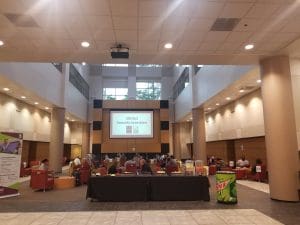Little Rock Congregations Study Holds Community Conversations Event

by Jack Schlotter
The University of Arkansas at Little Rock’s Little Rock Congregations Study (LRCS) research team, led by Dr. Rebecca Glazier and Dr. Gerald Driskill, held a “Community Conversations Event” for the team’s latest research project on May 7th, 2023 at the Reynolds Building Atrium at the University of Arkansas at Little Rock.
Members and leaders representing a wide array of diverse religious groups and community members across the city of Little Rock were in attendance. Being paired with others from across the community, participants engaged in one-on-one discussions on some of the most important issues facing the community.
The Little Rock Congregations Study has been involved in researching communities of faith across the city of Little Rock and the various ways they engage with community issues. Recently, the study has focused on how places of worship might be discussing race in religious settings.

Of particular interest to the study is research on how discussions of race in religious settings vary and how different congregations approach the issue. In the wake of the 2020 protests following the death of George Floyd, some congregations started new conversations about race, some continued ongoing conversations, and some sought to keep what they saw as political issues out of their places of worship.
With this “Community Conversations” research project, the LRCS team wanted to see how one-on-one conversations between community members on important issues like race would go. The results provided new insights and qualitative data on how congregations have responded to newly reopened discussions on race, and how much effort has been put into confronting racism in the community.
For example, the team’s research showed that following discussions with community members of differing backgrounds, the trustworthiness of each race as perceived by participants in the study increased across the board. Similarly, the general response from attendees was positive: many respondents kept in touch with their conversation partner and the event was rated 9.3/10 in a post-event survey.
In discussing why these conversations are so important, Dr. Rebecca Glazier responded “Our research team has seen the power of one-on-one conversations between clergy through events like our Religious Leaders Summits, and we were excited to bring together community members to see how just talking with someone new and getting to know them as a person could make otherwise challenging conversations much easier. We are really encouraged by the results, which are overwhelmingly positive.” Dr. Gerald Driskill responded “Engaging in one on one conversations is the place where we are drawn out of our comfort zones. In this space, we can learn more about ourselves and others, more about how we are more similar than different, and yet also learn from our differences. Then, as a result, trust is built so that we can work together for our community.”

Student researchers also found considerable value in facilitating these conversations. Student researcher Owen Haynes said “I think it was really inspiring that so many people from different backgrounds in Little Rock came together and had such a good time. People were laughing and joking, and people that I interviewed ended up becoming friends afterwards, so I think it was a really positive experience.”
With a positive response to the event and promising data, it is apparent that the Little Rock Congregations Study is making significant progress on investigating the power and importance of one-on-one conversations regarding racial justice.
